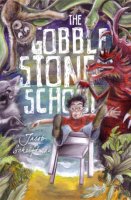 The Gobblestone School: A Tale Inspired by the German Criminalization of Homeschooling, by Jacob Schriftman (aka Jokim Schnoebbe)
(Moonrise/CreateSpace, Scotts Valley, California, 2009)
The Gobblestone School: A Tale Inspired by the German Criminalization of Homeschooling, by Jacob Schriftman (aka Jokim Schnoebbe)
(Moonrise/CreateSpace, Scotts Valley, California, 2009)
I wanted to like this book.
First, I wanted to read it, and for that I had to buy it, as it was not available in the library. It languished in my Amazon "save for later" cart for a while, but I recently decided to indulge myself. I'm glad I read it, but as indulgence goes, I'd rather have dark chocolate. (More)
 Indoctrinate U (On the Fence Films, 2007)
Indoctrinate U (On the Fence Films, 2007)
Indoctrinate U has been on my "watch list" for a while, but I hadn't been able to make myself take the time. It's not available from Netflix, but I found it on YouTube, in nine parts of about 10 minutes each. Today it came up on my "get this done today" list, so I thought I'd watch one or two of the segments. But they don't end in good places, and anyway I got hooked, so I watched the whole thing.
This documentary on discrimination, intolerance, and anti-diversity in American higher education is obviously not a high-budget film, though I'm sure it's better in the original format. I agree with Janet's comment that "it only pointed out the problems and didn't discuss any causes or better yet, idea for fixing the problems," and fear she may be right that it might be more divisive than helpful. Nonetheless, it's an important film to watch for anyone attending, planning to attend, or sending money to a college or university. I am not advocating staying away from college; but do be aware of the larger picture.
Although the film looks with some nostalgia on university life in the 1960's, there was plenty of intolerance for diversity of thought even then, though it was not, as now, enshrined in the bureaucracy, and the hard sciences (where I was) were mostly free of that, at least as far as the students were concerned. Our professors had a hard enough time teaching us math and physics, and didn't feel that taking time for political discussion would help us understand differential equations any better. I'm told by math professor friends that that has now changed. One, who has taught both in the United States and in Africa, expressed frustration that her American university required her to teach her not only calculus, but also the importance of African mathematics. I'm not sure what "African mathematics" might be that is important for a university math major to learn (I missed it in my classes), but I wouldn't be surprised if in the future the important mathematicians are African—because her African students are eager to learn the content, not the politics, of math.
The investigator for Indoctrinate U has been criticized for his confrontational approach, but while I do think one cannot expect to see a university president without an appointment, as journalists go, he was about as mild and polite as you can get.
Yes, the film is one-sided, and not only because they couldn't get anyone from the university side to talk seriously with them. It presents, however, a side that is not usually heard—indeed, is often censored, mocked, threatened, and attacked—and can be forgiven for being a little strident.
Here is the first segment; from there YouTube will provide links to the remaining eight. Be patient with the first couple, as at least I found the emphasis on affirmative action less interesting than the general topic of free speech on campus, which is more clearly presented in later parts. (There is a small number of profanities—quoting from a threat to a student and from the title of a play—that are bleeped out if you get the "clean" version, but the download versions are unaltered.)
I wish they had made more of a distinction between public and private colleges. To me, there's a huge difference between what a private school chooses to allow or forbid, and what a taxpayer-funded school does. But in either case, if the school is presenting itself as a bastion of diversity, tolerance, and academic freedom, evidence to the contrary needs to be heard. Caveat emptor.
Is there a solution? Confronting the universities with their own stated diversity policies is a start: Janet had some success at her school that way. In the long run, I think the biggest difference will be made by India and the Internet. American universities have long enjoyed near-monopolistic dominance in their field. However, as it did for their manufacturing and information technology counterparts, that privilege is coming to an end. When people have choices, change happens.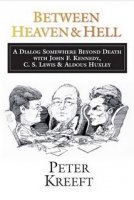
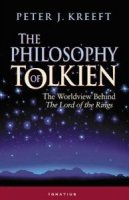 Between Heaven and Hell: A Dialog Somewhere Beyond Death with John F. Kennedy, C. S. Lewis & Aldous Huxley, by Peter Kreeft (InterVarsity Press, Downers Grove, Illinois, 2008)
Between Heaven and Hell: A Dialog Somewhere Beyond Death with John F. Kennedy, C. S. Lewis & Aldous Huxley, by Peter Kreeft (InterVarsity Press, Downers Grove, Illinois, 2008)
The Philosophy of Tolkien: The Worldview Behind "The Lord of the Rings," by Peter Kreeft (Ignatius Press, San Francisco, 2005)
Someone recommended to me Peter Kreeft's Jesus-Shock. But our library doesn't have it, and before ordering it I decided it would be a good thing to sample his books that I could borrow—my previous experience with Peter Kreeft being pretty much limited to the banner we saw at MIT, advertising his upcoming visit. Hence the unexpected addition of two new books to my reading list while there are still so many at home waiting to be read! At least they are short books that didn't take long to read. (More)
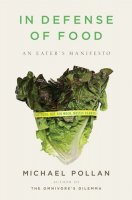 In Defense of Food: An Eater's Manifesto, by Michael Pollan (Penguin, New York, 2008)
In Defense of Food: An Eater's Manifesto, by Michael Pollan (Penguin, New York, 2008)
I'm in the middle (okay, the beginning) of two rather hefty books at the moment, Susan Wise Bauer's The History of the Ancient World, and my latest review book from Thomas Nelson, The Chronological Guide to the Bible. It's great to be reading the two of them together, though that means it will be a long time before I can review either one.
And now longer still, as the library e-mailed to let me know that I'd made it to the top of the waiting list for In Defense of Food. Michael Pollan is shaping up to be the next John Taylor Gatto for me: a modern author whose books I simply can't resist and can't put down. Reading was the easy part; reviewing without quoting from every page is the difficulty. The book is bristling with my neon green and pink sticky notes. (More)
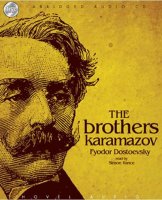 The Brothers Karamazov, by Fyodor Dostoevsky
(Hovel Audio, read by Simon Vance, abridged by Thomas R. Beyer)
The Brothers Karamazov, by Fyodor Dostoevsky
(Hovel Audio, read by Simon Vance, abridged by Thomas R. Beyer)
I normally don't care for abridged versions of books, but this version was a free download from Christianaudio.com. Since I've never read any of the great Russian novels, as an introduction, it's probably a good thing that this was abridged. If and when I read the actual book, I'll have a better chance of keeping all the characters straight, and of not getting lost in all the diversions. Having heard all the Russian names read aloud will no doubt be helpful, too. This version is 19 1/4 hours long; you can download the full 40-hour version from LibriVox if you'd like. There are also several online versions of the text, including one in the original Russian, if you're so inclined. (More)
 Homeschooling for the Rest of Us: How Your One-of-a-Kind Family Can Make Homeschooling and Real Life Work, by Sonya Haskins
(Bethany House, Minneapolis, 2010)
Homeschooling for the Rest of Us: How Your One-of-a-Kind Family Can Make Homeschooling and Real Life Work, by Sonya Haskins
(Bethany House, Minneapolis, 2010)
Sonya Haskins is a calm and reasonable voice speaking to the homeschooler—and potential homeschooler—who is overwhelmed and intimidated by the image of the "perfect" homeschooling experience: "Matching outfits, polite toddlers, award-winning students, fifteen-passenger vans, and family Web sites." (Raymond and Dorothy Moore did the same thing in the 1980s with Homeschool Burnout, which was updated and revised in the 1990s as The Successful Homeschool Family Handbook.) There's a lot of hype, confusion, and contradictory information out there, and Haskins' practical, back-to-basics approach and helpful suggestions will reassure timid beginners that they can, indeed, safely navigate the homeschooling waters. (More)
Ralph Vaughan Williams: Fantasia on
a Theme by Thomas Tallis
Mozart: Concerto No. 1 for Flute in G Major, K. 313 (285c)
Dvorak: Symphony No. 7 in D minor, op. 70
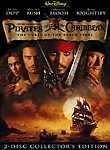 Pirates of the Caribbean: The Curse of the Black Pearl (Walt Disney Pictures, 2003, PG-13)
Pirates of the Caribbean: The Curse of the Black Pearl (Walt Disney Pictures, 2003, PG-13)
I realize I'm seven years behind most of the rest of the country in watching this movie, but at last I understand why our nephews love it so much. Maybe it's another example of the value of low expectations, but I can't remember the last time I enjoyed a movie so much. Just pure fun. Probably not grandchild material yet, but I wouldn't rate it worse than PG myself.
Sure, it's as unrealistic as Indiana Jones, and they break the rules of physics, biology, history, and more, but it's easy to suspend disbelief because it's not pretending to be real, or true to a book I love. It's plain fun, like the Disney Pirates of the Caribbean ride that inspired it. Perhaps the ride is one reason I enjoyed the movie so. Having had virtually unlimited access to the Disney parks when the kids were growing up, we became very familiar with this ride, and catching references to it in the movie is more fun than finding hidden Mickeys in the parks. The music is great, too.
We missed having Janet around, though. She would have told us in the beginning, "Hey, that guy played Legolas in The Lord of the Rings," whereas we only figured it out when the credits scrolled by.I had to watch it, since my genealogical organizations, websites, and contacts kept bringing it to my attention: NBC's new genealogy show, Who Do You Think You Are? My reactions? Mixed.
Each week, apparently, the show will present an investigation into the family history of one person. Supposedly these are famous people; I haven't heard of any of them, but that helps me concentrate on the data, which I find more interesting anyway. (More)
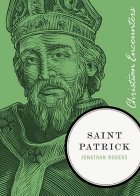 Saint Patrick, by Jonathan Rogers
(Thomas Nelson, Nashville, 2010)
Saint Patrick, by Jonathan Rogers
(Thomas Nelson, Nashville, 2010)
This new biography of the man whose feast day we celebrate this month is part of Thomas Nelson's Christian Encounters series. I was pleasantly surprised by the intellectual seriousness of this book, which I had expected to take a light and popular approach. It is certainly accessible, and short—just over 100 pages of text, plus appendices and notes—but packed with what little definitive information there is about this 5th century saint.
Although legends about St. Patrick abound, all that we truly know of him is deduced from two documents, written by Patrick himself later in life. Translations of both are included in the appendices. Rogers weaves together passages from these texts with cultural and historical background information to create a picture of both the man and his times. (More)
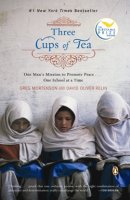 Three Cups of Tea: One Man's Mission to Promote Peace...One School at a Time, by Greg Mortenson and David Oliver Relin
(Penguin Books, New York, 2007)
Three Cups of Tea: One Man's Mission to Promote Peace...One School at a Time, by Greg Mortenson and David Oliver Relin
(Penguin Books, New York, 2007)
Greg Mortenson, the son of missionary parents, had a happy childhood in Africa, but his return to the United States as a teenager was rough, and it took him a long time to find his way. As he tells it, it took a dramatic failure to lead him to his calling—but I disagree that someone has failed who has not succeeded in climbing the infamous K2 because he expended too much time and energy rescuing a climber in distress. Whatever you call it, from that point in 1993 on, Mortenson's energies would be spent on a different form of rescue: building schools and promoting education, especially for girls, in the remote, impoverished villages of Pakistan and Afghanistan. Mortenson was nominated for the Nobel Peace Prize in 2009; even President Obama's most enthusiastic supporters cannot read Three Cups of Tea without entertaining a doubt or two as to the wisdom of the Nobel Committee's final choice. (The Nobel Committee overlooked Gandhi, too, so their peculiar judgement is not without precedent.) (More)
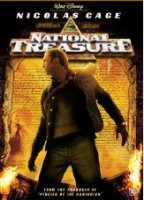 National Treasure (Walt Disney Pictures, 2004, PG)
National Treasure (Walt Disney Pictures, 2004, PG)
I may have discovered the secret of enjoying movies: low expectations. All I had known about National Treasure was that it had something to do with a puzzle in American history, and when I learned that it was instead more along the lines of The Da Vinci Code, I wanted nothing to do with it. My knowledge of history is shaky enough as it is—the last thing I need is another set of false "facts" cluttering up my brain, a la Braveheart and Amadeus. But I was assured the movie is so unbelievable that would not be a problem, and indeed that I probably wouldn't like it because of the great, glaring impossibilities.
So, armed with that knowledge, I really did enjoy the movie, in the same way that I enjoyed Raiders of the Lost Ark. Once you know it's ridiculous, it's actually funny. They even got some of the history right.
Between the two of us, we guessed a lot of the plot and even some of the lines, but the movie is about a puzzle so that only added to the enjoyment. And I always like seeing places I know, like Philadelphia's Franklin Institute and Independence Hall.
The rating is PG, but I didn't find anything that would make me issue a granchild warning—in fact, it reminded me of the McGuyver shows they like so much. A Journal of the Plague Year, by Daniel Defoe (New American Library, New York, 1960)
A Journal of the Plague Year, by Daniel Defoe (New American Library, New York, 1960)
I first read this as a requirement for school, I believe, though I remember nothing of it, not even the grade I was in. It has long been my theory that many schoolteachers take good books and make them boring, either by being bored themselves, or by presenting the books to students who don't have enough life experience to appreciate them. A Journal of the Plague Year is proof that some required books don't need any pedagogical interference to be boring.
The plague in question is the Great Plague of London in 1665. Defoe had been born about five years earlier, and wrote the Journal in 1722. It is a work of fiction, but written in such detail and with so much obvious research that it is impossible to tell where history ends and fiction begins. (More)
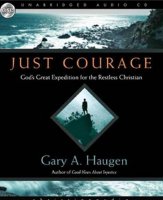 Just Courage: God's Great Expedition for the Restless Christian, by Gary Haugen (InterVarsity Press, Downers Grove, Illinois, 2008)
Just Courage: God's Great Expedition for the Restless Christian, by Gary Haugen (InterVarsity Press, Downers Grove, Illinois, 2008)
Christianaudio.com offers a free download each month, and a few months ago the offering was Just Courage. I'd rather read a book than listen to it, but audio books are perfect on my walks or when driving. It sounded interesting, and the price was certainly right.
Gary Haugen is the president and CEO of International Justice Mission.* I was not familiar with the organization before reading (listening to) Just Courage, but it's enough to make one hesitate before making the next lawyer joke. The description from their website sums their mission up well. (More)
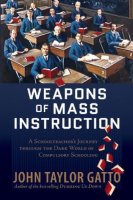 Weapons of Mass Instruction: A Schoolteacher's Journey through the Dark World of Compulsory Schooling, by John Taylor Gatto
(New Society Publishers, Gabriola Island, BC, Canada, 2009)
Weapons of Mass Instruction: A Schoolteacher's Journey through the Dark World of Compulsory Schooling, by John Taylor Gatto
(New Society Publishers, Gabriola Island, BC, Canada, 2009)
A pastor I know was fond of quoting Martin Luther, who, when asked why he preached on justification by faith every week, responded, "Because you forget it every week." John Taylor Gatto has no love for Martin Luther, but I can imagine him giving a similar response when asked why his books, articles, and lectures include so much that he has said before. He has a critically important message to deliver, and is clearly compelled to repeat it as many times and in as many ways as he can.
In his desperation to make people understand what he has learned, from his research and 30 years on the front lines of teaching, Gatto has become more pointed, strident and radical as time goes on. It's an understandable reaction—I remember noting the same effect in John Holt's writings, and I fall prey to it all too often myself—but for this reason I hesitate a little to recommend Weapons of Mass Instruction to anyone who is not already convinced of the dangers inherent in our pubic school system. And yet...I do recommend it, highly. Why? Let me digress. (More)


